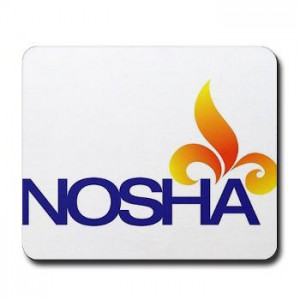From the Field: A Profile of the New Orleans Secular Humanist Association

This year, the host chapter of the Annual American Humanist Association Conference is the New Orleans Secular Humanist Association (NOSHA), an affiliate of the AHA. Founded in 1999, the group has since then grown and has become the city’s premier secular organization with multiple meetings every month. Here, NOSHA president Harry Greenberger, explores the New Orleans group’s history, its programs, and welcomes humanists from around the country to the Crescent City!
HNN: Tell me about how your group got started. What were its beginnings?
Harry Greenberger: In the fall of 1999 a young mother in New Orleans contacted the Council for Secular Humanism requesting information as to a local group. Since there was none at that time they suggested that she organize one and sent materials to be used. The first meeting at an area bookstore of a dozen or so people, previously unknown to each other, inaugurated New Orleans Secular Humanist Association (NOSHA.) I accepted their offer to become its first President, a position I have held for twelve years. A Board of Directors was established which has always included a number of college professors.
NOSHA received a State Charter and IRS approval as a non-profit corporation. From early small meetings, through word of mouth and networking, attendance at monthly meetings began to grow. A lengthy interview along with photographs appeared in the Times Picayune newspaper which brought attention to the group. A columnist for that newspaper has often written about the local secular group and its public appearances (including several occasions presenting a secular invocation to open City Council Meetings).
HNN: What programs does NOSHA offer to its members?
Harry Greenberger: With the exception of a few months following Hurricane Katrina floods, NOSHA has continued formal monthly meetings, generally with a speaker on a topic of interest, which included numerous notables in the secular movement along with local speakers with topics of importance. Such meetings always included Q&A time along with socialization and refreshments. In recent years NOSHA has presented well-attended anniversary banquets, with guest speakers Sean Faircloth, Ellen Johnson and Annie Laurie Gaylor.
The NOSHA website (nosha.org) is maintained and updated to provide a variety of materials for anyone wanting to know more about the group and its activities. AHA members planning to attend the New Orleans Conference will enjoy exploring this site, where quarterly newsletters can be seen.
For about ten years NOSHA has presented a public access television program, for which I have been the host with a variety of guests. It airs locally twice on Fridays and twice on Sundays. The programs have been converted to been seen through NOSHA’s website, where a menu of the shows allows the viewer to make selections.
There is an Internet discussion site which is available to persons on the mailing list after they request such access and are approved for it. Daily discussions on a multitude of topics are common.
HNN: How big is the humanist community in New Orleans? What has the public’s reaction to humanist and humanism been?
Harry Greenberger: Many people choose to be added to the mailing list, but not to become dues paying members. That mailing list now exceeds six hundred names. While Louisiana is not fertile ground for atheism our activities have not resulted in any backlash nor abasement.
HNN: How has NOSHA showed New Orleans examples of “being good without a god?”
Harry Greenberger: While NOSHA has not until recently planned public service activities, it has through the years been supportive of the ACLU, PFLAG, NOAIDS Task Force and the Gay and Lesbian Center and has lobbied against the Louisiana Science Education Act, which leaves an opening for the teaching of creationism.
Twice monthly there is a NOSHA social dinner club and happy hour at a variety of New Orleans restaurants and a Heretics Brunch on the last Sunday of some months. NOSHA celebrates the Summer and Winter Solstices with a pot luck party which is always well attended.
HNN: Where do you see the humanist movement in five years?
Harry Greenberger: NOSHA considers its hosting of the AHA Conference in New Orleans as a highlight in its history and hopes that its Welcome Reception at the event provides a taste of this city’s flavor.
For New Orleans and the rest of the country NOSHA people project a recovery from the Tea Party religious reactionaries and through the upcoming generations an enlargement of a secular society.
Eric Nguyen is the field coordinator for the American Humanist Association.
